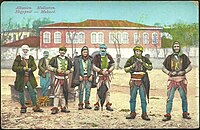Goljemadi
| Part of a series on |
| Albanian tribes |
|---|
 |
Gojëmadhi (Goljemadi, Cyrillic: Гољемади) was an Albanian tribe[1][2] (fis) that lived in the Middle Ages. They inhabited the Lješanska nahija region of Old Montenegro , being centered in the area around the village of Goljemadi, west of modern Podgorica.
Their name is a compound of the Albanian words gojë (meaning 'mouth') and madh (meaning 'big'). The name indicates the retention of the letter l in the word gojë.[3] The Gojëmadhi are first mentioned around western Montenegro in the year 1402.[4]
In the 1416-17 Venetian cadastre of Shkodra, mentions a certain Benk Goljamadhi inhabiting the village of Shirq near Dajç, Shkodër.[5] Mariano Bolizza in his voyage in the area in 1614 recorded that Belo Vujkov held 27 houses of the Golemadi, with 57 soldiers.[6]
Over time they were integrated into the neighbouring Slavic population. The village bearing their name still exists to this day.
References[]
- ^ Gashi, Skënder (2015). ONOMASTIC-HISTORICAL RESEARCH ON EXTINCT AND ACTUAL MINORITIES OF KOSOVA. ASHAK. p. 693.
- ^ Ajeti, Idriz (2017). ALBANIAN LANGUAGE STUDIES. ASHAK. p. 49.
- ^ Ajeti, Idriz (2017). ALBANIAN LANGUAGE STUDIES. ASHAK. p. 128.
- ^ Ajeti, Idriz (2017). ALBANIAN LANGUAGE STUDIES. ASHAK. p. 128.
- ^ Zamputi, Injac (1977). Regjistri i kadastrēs dhe i koncesioneve pēr rrethin e Shkodrës 1416-1417. Academy of Sciences of Albania. p. 105.
- ^ Early Albania: A Reader of Historical texts, 11th-17th Centuries. Robert Elsie. 2003. p. 155. ISBN 9783447047838.
- Tribes of Montenegro
- Albanian communities in Montenegro